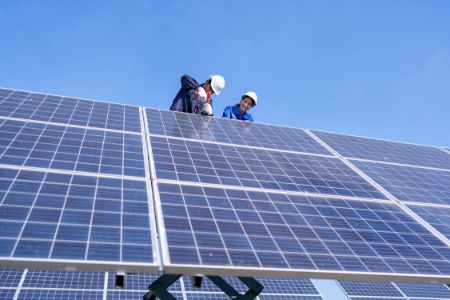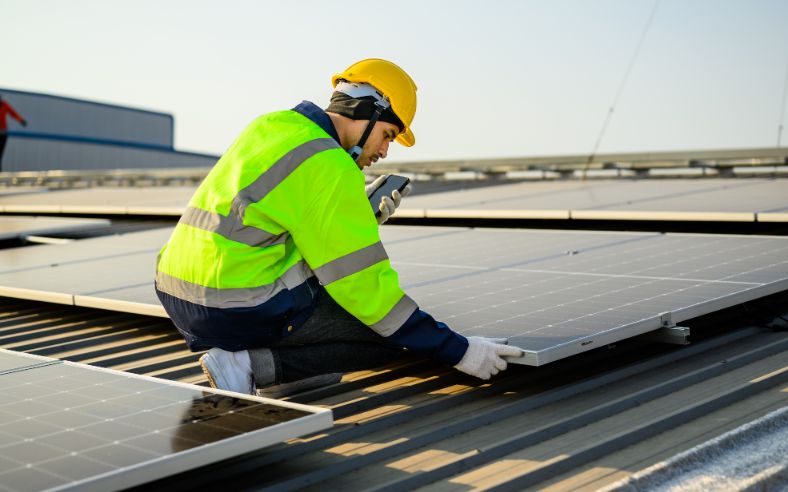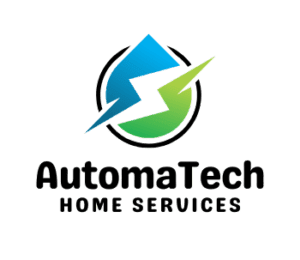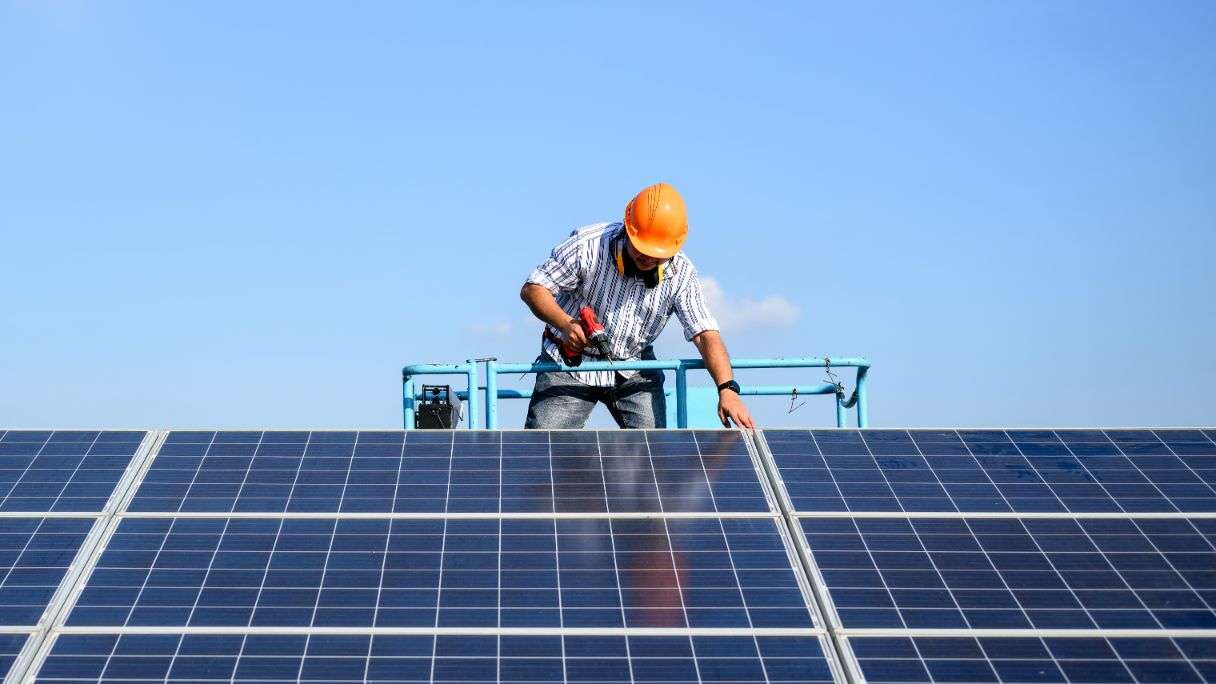In the rapidly changing landscape of energy, fear is often the product of unfamiliarity. As the world seeks sustainable solutions to meet our growing energy needs, many individuals and businesses are turning towards solar energy. But understanding how to harness this incredible source of renewable power can seem daunting to some. Yet, fear not! With a well-informed approach, a touch of patience, and a commitment to a greener future, using solar energy can be simple, beneficial, and surprisingly liberating.
The prospect of transitioning to a new form of energy can be daunting for many, especially if you’re unfamiliar with the technology. But when used properly, solar energy can provide a host of benefits for individuals, businesses, and even entire communities. Here’s how you can use solar energy the right way:
- Understand How Solar Energy Works: Solar panels convert sunlight into electricity through photovoltaic cells. The more sunlight the panels receive, the more electricity they can generate. Understanding the basic principles of solar energy can help you make the most of your solar panel system.
- Get a Professional Assessment: Before installing solar panels, have a professional assess your property to determine if it’s suitable for solar power. They’ll evaluate factors like your roof’s orientation, shading, and the local climate.
- Choose the Right Solar Panel System: There are different types of solar panel systems available, such as grid-tied, off-grid, and hybrid systems. Each one has its own set of pros and cons, so it’s important to choose the one that fits your needs and situation best.
- Maintenance: Proper maintenance of your solar panels can ensure they function effectively over their lifespan, which can be 25 years or more. Regular cleaning and professional check-ups can help detect any issues early and keep the system running at peak efficiency.
- Optimize Energy Use: Solar panels produce electricity during the day, so it’s more efficient to use energy-intensive appliances during daylight hours. If you have a solar battery storage system, you can store excess energy produced during the day for use at night.
- Understand Your Local Policies: It’s important to familiarize yourself with local regulations and incentives related to solar energy. Many places offer tax credits, rebates, or other incentives for installing solar panels.
- Invest in a Quality System: While upfront costs for quality solar systems may be higher, they often provide better performance, longevity, and warranties.
- Monitor Your System: Most solar panel systems come with monitoring software that lets you see how much energy your system is producing and consuming. This can help you understand your energy habits and make adjustments as necessary.
- Be Patient with Return on Investment: The financial benefits of solar energy come over time as you save on electricity bills. Depending on various factors like local electricity rates and the cost of your system, it can take several years to recoup your initial investment.
- Embrace Energy Independence and Sustainability: By using solar energy, you’re reducing your reliance on fossil fuels and contributing to a sustainable future. This is a benefit that goes beyond financial savings and can be a source of pride for many solar energy users.
By following these guidelines, you can use solar energy in a way that benefits you, your community, and the environment as a whole. There’s no need to fear the switch to solar power – with careful planning and understanding, it’s an investment that can pay off in numerous ways.
Understand How Solar Energy Works
 The process of solar energy conversion involves some fascinating principles of physics. Here’s a step-by-step breakdown of how solar energy works:
The process of solar energy conversion involves some fascinating principles of physics. Here’s a step-by-step breakdown of how solar energy works:
Solar Panel Exposure to Sunlight:
Solar panels need to be exposed to sunlight to start the energy conversion process. The panels are made up of several solar cells, which are constructed with a special type of material called a semiconductor, usually silicon.
Creation of Electric Current:
When sunlight hits a solar cell, it excites the electrons in the silicon. The energy from the sun gives these electrons enough power to move, and this movement creates an electric current.
The function of Photovoltaic Cells:
This electric current flows through what’s known as a photovoltaic (PV) cell. Photovoltaic means “light electricity.” In these PV cells, the excited electrons are pushed out of the silicon and into a conductive metal plate that carries the electrons along wires. This movement of electrons is what we refer to as electricity.
Conversion to Usable Energy:
This electricity, however, is in a form known as direct current (DC). Most homes and appliances use alternating current (AC), so the DC electricity from the solar panels needs to be converted. This is done by a device called an inverter, which is typically part of your solar panel system.
Distribution of Power:
Once the electricity has been converted to AC, it’s ready to be used in your home. Any electricity you don’t use can often be sent back to the electricity grid (if your system is grid-tied), or stored in a home battery system for use when the panels aren’t producing power, like at night.
Monitoring of System:
Most solar energy systems come with a monitoring system that allows you to see how much electricity your panels are generating and how much power you’re consuming.
The entire process of converting sunlight to electricity is emission-free and produces no noise, making solar power one of the cleanest and quietest forms of renewable energy. Understanding how this process works can not only help you to better manage your energy usage, but also to appreciate the remarkable technology that is turning sunlight into usable power.
Get a Professional Assessment
 Getting a professional assessment before installing solar panels is crucial for a successful transition to solar power. Here’s why each of these factors is important and what a professional assessment might look like:
Getting a professional assessment before installing solar panels is crucial for a successful transition to solar power. Here’s why each of these factors is important and what a professional assessment might look like:
Roof’s Orientation:
The orientation of your roof affects how much sunlight your solar panels can capture. In the Northern Hemisphere, a south-facing roof is often considered ideal as it gets the most sunlight throughout the day. However, east and west-facing roofs can also be suitable. The professional will assess your roof’s orientation to determine the potential solar panel efficiency.
Shading:
Any shading on your roof from nearby trees, buildings, or other structures can reduce the amount of sunlight your panels receive, thereby limiting their power output. The assessor will evaluate the level of shading on your property throughout the day and across different seasons.
Local Climate:
Solar panels can work in most climates, but the amount of sunlight your area receives will impact the efficiency and power production of your solar panels. Areas with more sunny days per year will naturally produce more solar energy. Your local weather patterns and the amount of annual sunshine will be taken into consideration.
Roof’s Condition and Material:
The condition of your roof is also vital. A roof that is nearing the end of its life or is in poor condition may need to be repaired or replaced before solar panels can be installed. Additionally, some roofing materials are more suitable for solar installations than others. The professional will assess the condition and type of your roof.
Energy Consumption:
The assessor will also likely review your past electricity bills or energy usage to size the system correctly. The aim is to match your energy consumption with the energy your solar panel system will produce.
Local Regulations and Incentives:
Professionals should be up-to-date with local regulations and zoning laws concerning solar panel installations. They should also inform you of any local or federal incentives that can help offset the cost of the system.
A professional solar assessment, often referred to as a solar site assessment, will provide you with a clear understanding of your property’s solar potential and any challenges that might need addressing. By getting this assessment, you can ensure that your investment in solar energy is well-founded and maximally beneficial.
Choose the Right Solar Panel System
 Choosing the right solar panel system is a critical step in your solar energy journey. There are mainly three types of systems – grid-tied, off-grid, and hybrid systems. Each has its unique advantages and is best suited for different circumstances. Let’s explore each one in more detail:
Choosing the right solar panel system is a critical step in your solar energy journey. There are mainly three types of systems – grid-tied, off-grid, and hybrid systems. Each has its unique advantages and is best suited for different circumstances. Let’s explore each one in more detail:
Grid-Tied Systems:
These are the most common type of solar panel systems. As the name suggests, they are connected to the local electric grid. During the day, your solar panels may produce more electricity than you need. This excess power is fed back into the grid, and you’ll often get a credit from your utility company that you can use when your panels aren’t producing enough power, like at night or during cloudy days. These systems are less expensive as they don’t require a battery. However, they will not provide power during a grid outage since the system is designed to shut off to ensure the safety of the workers repairing the grid.
Off-Grid Systems:
Unlike grid-tied systems, off-grid systems are not connected to the electric grid. These systems require battery storage since they need to store the excess power produced during the day for use when the panels aren’t producing electricity. Off-grid systems are ideal for remote locations where connecting to the grid may be impractical or too expensive. However, these systems are typically more expensive and require more maintenance due to the addition of batteries.
Hybrid Systems:
Hybrid systems combine the features of grid-tied and off-grid systems. They are connected to the grid and also incorporate battery storage. This allows homeowners to store excess power for use during grid outages or when electricity rates are high, providing an excellent balance of reliability and efficiency. They are more expensive than grid-tied systems due to the cost of the batteries but provide more independence and security than both the previous systems.
When deciding on the type of system, consider factors such as your budget, the reliability of your local grid, your energy needs, and your location. A professional solar installer can guide you through the decision process and help you choose the system that suits your needs and preferences best.
Maintenance
 Maintaining your solar panel system is crucial for its longevity and efficiency. While solar panels generally require low maintenance, there are a few things to keep in mind to ensure they function effectively over their lifespan:
Maintaining your solar panel system is crucial for its longevity and efficiency. While solar panels generally require low maintenance, there are a few things to keep in mind to ensure they function effectively over their lifespan:
Cleaning:
Solar panels can accumulate dust, dirt, bird droppings, leaves, and other debris, which may block sunlight and reduce their efficiency. It’s essential to clean them regularly. The frequency depends on the local climate and how quickly debris accumulates. In most cases, cleaning once or twice a year is sufficient, but in some areas, more frequent cleaning might be required. Always follow the manufacturer’s instructions or hire a professional cleaning service, as incorrect cleaning can damage the panels.
Inspection:
Regularly inspect your solar panels for any damage, like cracks or chips. While solar panels are designed to withstand harsh weather conditions, they can still be damaged by severe storms, hail, or falling debris. If you spot any damage, call a professional for repairs.
Professional Check-ups:
Arrange for professional check-ups every few years or as recommended by your solar provider. Professionals will examine the entire system, including the panels, mounting equipment, and inverter, to ensure everything is functioning correctly. They can also carry out any necessary repairs or replacements.
Monitoring System:
Most solar panel systems come with monitoring software that allows you to track the system’s performance. Keep an eye on the energy output to notice any significant drops that could indicate a problem.
Maintain Clear Access:
Keep the area around your solar panels clear to ensure they get maximum sunlight. This might involve trimming any overhanging branches or removing any structures that cast a shadow on the panels.
Battery Maintenance:
If your system includes batteries, they may require additional maintenance. Always follow the manufacturer’s instructions or consult a professional for battery maintenance.
Proper maintenance can help detect potential issues early, prolong the lifespan of your solar panel system, and ensure it runs at peak efficiency, helping you to maximize the benefits of your investment in solar power.
Optimize Energy Use
Optimizing energy usage can significantly increase the benefits of your solar panel system. Here are a few strategies to optimize your energy use:
can significantly increase the benefits of your solar panel system. Here are a few strategies to optimize your energy use:
Shift Energy Usage:
Solar panels produce electricity when the sun is shining. Therefore, running your appliances during daylight hours will use the power generated by your solar panels instead of drawing power from the grid. These appliances might include washing machines, dishwashers, vacuum cleaners, or any other high-energy devices.
Energy-Efficient Appliances:
Consider investing in energy-efficient appliances, which require less electricity to run. This can further reduce your reliance on grid electricity, making the most of your solar power.
Use Timers:
Many appliances come with timer settings. You can set these to run the appliance during peak solar production hours. This can be particularly useful for appliances like water heaters or dishwashers.
Smart Home Technology:
Consider incorporating smart home technology, which can help you monitor and control your energy use. Smart devices allow you to schedule the operation of appliances during optimal times of the day and can provide insights into your energy consumption habits.
Solar Battery Storage:
If your solar panel system includes battery storage, you can store excess electricity produced during the day to use at night or during power outages. This helps to maximize your use of solar-generated power, further reducing your reliance on grid electricity.
Grid Electricity Use:
If you don’t have battery storage, plan to use grid electricity for your essential needs during the night, such as lighting and charging devices. Remember, if you have a grid-tied system, the excess solar power you feed into the grid during the day can offset the cost of the power you draw from the grid at night.
By adopting these strategies, you can make the most of your solar energy, reduce your energy costs, and increase the effectiveness and savings of your solar panel system.
Understand Your Local Policies
 Local policies and incentives can significantly affect the feasibility, cost, and overall benefits of installing a solar panel system. They can also provide additional financial benefits that can make solar energy more accessible and affordable. Here’s what you should look out for:
Local policies and incentives can significantly affect the feasibility, cost, and overall benefits of installing a solar panel system. They can also provide additional financial benefits that can make solar energy more accessible and affordable. Here’s what you should look out for:
Net Metering Policies:
Many areas have net metering policies that allow you to sell excess power back to the grid. This can help offset the cost of any electricity you draw from the grid when your panels aren’t producing enough power. It’s important to understand how net metering works in your area and what rates you can expect.
Tax Credits:
Some governments offer tax credits for installing solar panels. In the United States, for example, the federal government provides the Investment Tax Credit (ITC), which allows homeowners and businesses to deduct a percentage of the cost of installing a solar energy system from their taxes.
Local Rebates and Incentives:
On top of federal incentives, many states, cities, and utility companies offer additional rebates, grants, or incentives for going solar. These can significantly reduce the upfront cost of your system.
Feed-in Tariffs:
In some regions, governments or utilities offer feed-in tariffs where they buy the electricity generated by your solar panels at a premium rate. This policy encourages the use of renewable energy sources by making them more profitable for consumers.
Permits and Regulations:
Local permits and regulations for installing solar panels can vary widely. It’s crucial to understand the requirements in your area to ensure a smooth and legal installation process.
Renewable Energy Certificates (RECs):
In some markets, when a solar system generates electricity, it creates RECs. Solar owners can sell these RECs to utilities, which use them to meet mandatory renewable energy targets.
Understanding these policies can not only help you navigate the process of going solar but can also help you make the most of the financial incentives available to you. It’s always a good idea to consult with a local solar professional or a financial advisor to understand the benefits you may be eligible for when transitioning to solar energy.
Invest in a Quality System
 Investing in a high-quality solar panel system is a wise decision that pays off in the long run. While the initial investment might be higher, the benefits of a quality system are far-reaching:
Investing in a high-quality solar panel system is a wise decision that pays off in the long run. While the initial investment might be higher, the benefits of a quality system are far-reaching:
Better Performance:
Quality solar panels typically have higher efficiency ratings, which means they can convert more sunlight into electricity compared to lower-quality panels. This greater efficiency can lead to more significant savings on your electricity bill.
Longevity:
High-quality solar panels are often more durable and can withstand harsh weather conditions better than their lower-quality counterparts. This durability can extend the lifespan of your system, ensuring that your investment continues to generate returns for years to come.
Warranties:
Most quality solar panel manufacturers offer extended warranties that can cover your system for 25 years or more. These warranties can give you peace of mind knowing that you’re covered if any issues arise with your panels.
Future Savings:
Although the upfront cost of a high-quality system may be higher, future savings in terms of lower energy bills and fewer repair costs can make up for the initial expense. Over time, a quality system can be more cost-effective than a cheaper, lower-quality one.
Increased Home Value:
A quality solar panel system can increase your home’s value. According to research, homes with solar energy systems sell for more than homes without them.
Environmental Impact:
Quality systems tend to be more efficient and produce more electricity over their lifetime, leading to a larger reduction in greenhouse gas emissions.
When choosing a solar panel system, it’s crucial to look beyond just the initial cost. Consider the efficiency, quality, warranty, and company reputation. By investing in quality, you’re investing in a system that will provide reliable, renewable energy for your home for many years to come.
Monitor Your System
Monitoring your solar panel system is a crucial aspect of maximizing your solar benefits and optimizing your energy usage. The benefits of monitoring your solar system include:
is a crucial aspect of maximizing your solar benefits and optimizing your energy usage. The benefits of monitoring your solar system include:
Performance Tracking:
Monitoring software allows you to track the performance of your solar panel system in real time. You can see how much energy your system is producing at any given time and over specific periods, which can help you identify trends or potential issues.
Fault Detection:
Monitoring systems can detect and alert you to performance issues or faults with your solar panels or inverter. Early detection of issues can lead to quick fixes and fewer losses in energy production.
Understanding Energy Usage:
By monitoring your energy production and consumption, you can better understand your energy usage habits. You may find that certain appliances or times of day lead to high energy use, and you can adjust accordingly to optimize your solar energy usage.
Energy Independence:
Monitoring can help you increase your energy independence by maximizing the use of your solar production and reducing your reliance on the grid. This is particularly useful if you have a battery storage system and want to optimize when you use your stored energy.
Financial Savings:
By monitoring and adjusting your energy use habits, you can save money on your utility bills. You can use more solar energy when it’s abundant and reduce your usage or draw from a solar battery when your panels aren’t producing much electricity.
Reporting and Forecasting:
Some monitoring systems provide reporting features that allow you to analyze your historical data and forecast your future energy production. This can help you plan and budget your energy use.
Remember to check your monitoring system regularly and utilize its features to the fullest to make the most of your solar panel system. If you’re unsure how to interpret the data, consult with your solar panel provider or a solar energy expert. They can help you understand the information and provide guidance on how to optimize your solar energy use
Be Patient with the Return on Investment
 Patience is key when it comes to realizing the return on your solar energy investment. Installing a solar panel system requires a significant upfront cost, but the financial benefits accumulate over time, eventually outweighing the initial expenditure. Here are some things to keep in mind regarding the return on investment (ROI) of your solar energy system:
Patience is key when it comes to realizing the return on your solar energy investment. Installing a solar panel system requires a significant upfront cost, but the financial benefits accumulate over time, eventually outweighing the initial expenditure. Here are some things to keep in mind regarding the return on investment (ROI) of your solar energy system:
Savings on Utility Bills:
One of the primary ways you’ll recoup your investment in solar energy is through savings on your electricity bills. With solar panels, you may be able to drastically reduce your reliance on grid electricity or even eliminate your electricity bill.
Net Metering and Feed-In Tariffs:
If your region has net metering policies or feed-in tariffs, you can earn money by selling the excess energy your solar panels produce back to the grid. These earnings can help offset the cost of your system.
Incentives and Tax Credits:
Government incentives, grants, and tax credits can significantly reduce the cost of your solar energy system, effectively shortening the payback period.
Solar Energy System Lifespan:
High-quality solar panels can last for 25 years or more. The longer your panels last, the longer you’ll be able to benefit from the savings they provide.
Increased Property Value:
Solar panels can increase the value of your property, providing financial benefits if you decide to sell your home.
Cost vs. ROI:
The ROI of your solar panel system will depend on several factors, including the system’s cost, the amount of sunlight your location receives, local electricity rates, and available incentives. It may take several years to recoup your initial investment, but once you reach the “break-even point,” the savings or income from your solar panels are essentially profit.
Investing in solar energy is not just a financial decision but also an environmentally conscious one. By harnessing the power of the sun, you’re reducing your carbon footprint and contributing to a more sustainable future. Patience pays off in both a monetary and environmental sense, making solar energy a worthwhile investment.
Embrace Energy Independence and Sustainability
 Embracing solar energy is about more than just financial savings and ROI; it’s about making a significant and positive impact on our environment and energy independence. Solar power enables you to harness clean, renewable energy directly from the sun, thereby contributing to a more sustainable and environmentally-friendly future. Here’s a closer look at these benefits:
Embracing solar energy is about more than just financial savings and ROI; it’s about making a significant and positive impact on our environment and energy independence. Solar power enables you to harness clean, renewable energy directly from the sun, thereby contributing to a more sustainable and environmentally-friendly future. Here’s a closer look at these benefits:
Energy Independence:
Solar panels allow you to generate your electricity, reducing your dependence on the grid and fossil fuels. This means you’re less impacted by fluctuations in energy prices, and you can still have power in case of an outage if you have a battery storage system.
Reduction in Greenhouse Gas Emissions:
Solar energy is a clean, green source of power. By transitioning to solar power, you’re reducing the amount of greenhouse gases released into the atmosphere because you’re using less energy from fossil fuels. Every kilowatt-hour of solar-generated electricity reduces your carbon footprint, helping mitigate climate change.
Conservation of Water:
Traditional power plants require massive amounts of water to cool generators and produce power. In contrast, solar panels require no water to generate electricity, contributing to water conservation.
Sustainable Growth:
Solar power is an integral part of a sustainable growth strategy. It encourages the use of a renewable resource (the sun), promotes technological innovation, and can generate local jobs, fostering economic growth while preserving the environment.
A Sense of Pride:
Lastly, using solar energy can instill a sense of pride. Knowing that you’re contributing to the fight against climate change and making a difference for future generations can be rewarding.
Embracing solar energy is a significant step towards energy independence and a sustainable future. Whether you’re motivated by environmental considerations, the desire for energy independence, or the financial benefits, the advantages of solar power are clear and abundant. So, harness the power of the sun, enjoy your savings, and take pride in knowing that you’re doing your part to protect our planet.
With these tips and strategies in mind, the transition to solar energy can be as bright as the sun itself. Harnessing the power of solar energy doesn’t need to be a source of fear or uncertainty. Rather, it can be a journey towards energy independence, reduced carbon footprint, and tangible financial savings. As we tread forward in these exciting times of the energy revolution, using solar power the right way can pave the path to a more sustainable, economically viable, and greener future for all. Let’s embrace the sunshine, and let its energy guide us toward a future where fear has no place.

